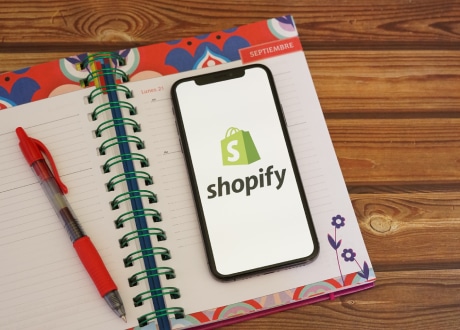BigCommerce vs Shopify – Comparing the Two Best Hosted Ecommerce Platforms
BigCommerce vs Shopify comparison is one of the hottest topics of discussion when it comes to choosing between the two of the industry-best hosted eCommerce software. However, once you get to know which user base each platform is targeting, you will come to know the key differences between them. BigCommerce largely focuses on larger eCommerce stores and brands. It is much easier to manage web content and tons of SKUs with BigCommerce as compared to Shopify. Conversely, Shopify is an ideal solution for smaller boutiques or dropshipping.
In this comprehensive BigCommerce vs. Shopify comparison guide, we’ll compare both of these platforms to help you choose the best one for your eCommerce store.

Interested in Learning More About Wix and Shopify eCommerce Platforms?
Shopify versus BigCommerce
BigCommerce
| Summary | Ratings |
|---|---|
| Highly flexible and scalable | Value for Money — 4.0 |
| Excellent multi-channel selling | Ease of Use — 4.8 |
| Highly SEO-friendly platform | Design & Themes — 3.8 |
| Inconsistent page loading speed | Features & Functionalities — 3.9 |
| Large-scale online stores pay more. | Seamless Integrations — 4.2 |
| No one-click selling | Site Performance — 4.5 |
| Overall Score | |
| 4.3 – star rating | |
Shopify
| Summary | Ratings |
|---|---|
| Fastest page loading time | Value for Money — 4.0 |
| Quick and easy setup | Ease of Use — 4.9 |
| One-click selling apps are available | Design & Themes — 4.0 |
| Not good at SEO/Content Marketing | Features & Functionalities 3.8 |
| Checkout not customizable | Seamless Integrations — 4.6 |
| Costly Apps | Site Performance — 3.9 |
| Overall Score | |
| 4.2 – star rating | |
BigCommerce
In the Shopify vs BigCommerce comparison, BigCommerce is considered as the best overall eCommerce software. Founded in 2009, BigCommerce is a SaaS eCommerce platform that is best suited for large-scale online retail brands aspiring to expand and grow their business. It comes with a robust product search feature that is ideal if you want to sell many products. If you have a well-defined brand and planning to scale your business, BigCommerce is the best option for you.
| Pros | Cons |
|---|---|
| Easy to use | Design and selling limitations |
| Risk-free 15-days trial period | Fewer and expensive apps and integrations than Shopify |
| Facilitates multi-channel sales | No built-in 1-click selling |
| Provides real-time shipping quotations and gift cards | |
| Better cart abandonment recovery setup | |
| Advanced SEO and marketing tools built to make marketing your site easy |
Shopify
Just like BigCommerce, Shopify can also be used by anyone without necessarily taking help from experts. Founded in 2006, Shopify is an ideal solution for those who are entering into the world of eCommerce. If you’re new to eCommerce and don’t have a well-defined brand and marketing strategy, using Shopify is the best bet for you.
| Pros | Cons |
|---|---|
| Unlimited selling | You need third-party apps to extend the functionality of your website |
| Risk-free 14-days trial period | Weak SEO functionality |
| More integrations and apps | Transaction fees for third-party payment gateways |
Pricing is an important factor that you need to consider when comparing Shopify versus BigCommerce as you will have to pay for other eCommerce tools along with your shopping cart. Hence, you need to choose one that does not burn a big hole in your pocket. Both BigCommerce and Shopify offer multiple subscription options, and free trial periods so that you can test them before you buy the plans.
BigCommerce
- $29.95/Month – Standard
- $79.95/Month – Plus
- $299.95/Month – Pro
- Custom pricing – BigCommerce Enterprise
Shopify
- $9 – Shopify Lite Plan – Embeddable cart, enabled face-to-face purchases, and a buy button that you can place on social media pages, no standalone store website.
- $29 – Basic Shopify Plan/Month
- $79.95 – Shopify/Month
- $299.95 – Advanced Shopify/Month
- Custom quote – Plus Reserved for enterprise-level customers.
Both platforms offer plans that provide users with more features and admin accounts. However, each platform comes with its own set of differences. Since the pricing plans of both platforms are virtually equal, you should consider drawbacks with each plan.
On both platforms, each step up in plan grants users more features and admin accounts. But each platform has a key difference from the other. Since the prices on each are virtually identical, you’ll need to pick your poison when it comes to these drawbacks.
- On BigCommerce, each pricing plan has got a sales limit. The monthly charges that you’ll pay will increase as your revenue increases.
- On Shopify, you need to pay transaction fees ranging from 0.5% to 2% of each sale that you make. Luckily, if you choose and are eligible to use Shopify’s in-house payment processor, Shopify Payments, you don’t need to pay the extra commission per sale.
Overall, both platforms are competitively priced, providing unlimited online storage, bandwidth, and products on each of their pricing plans. If you understand the key differences between BigCommerce vs Shopify, you can select the best-suited platform and its pricing plan.
BigCommerce
| Features | Standard $29/month | Plus $79/month | Pro $299/month |
|---|---|---|---|
| Landing Page Builder | Included in Plan | Included in Plan | Included in Plan |
| Digital Products | Included in Plan | Included in Plan | Included in Plan |
| Product Export/Import | Included in Plan | Included in Plan | Included in Plan |
| Rating & Reviews | Included in Plan | Included in Plan | Included in Plan |
| Real Time Shipping Rates/Tracking | Included in Plan | Included in Plan | Included in Plan |
| SEO Tools | Included in Plan | Included in Plan | Included in Plan |
| Zoomable Product Images | Included in Plan | Included in Plan | Included in Plan |
| Abandoned Cart Email | Not Available | Included in Plan | Included in Plan |
| Product Search | Not Available | Not Available | Included in Plan |
| Personalized Products | Paid App Needed | Paid App Needed | Paid App Needed |
| Reward Points | Paid App Needed | Paid App Needed | Paid App Needed |
| Subscription/Recurring | Paid App Needed | Paid App Needed | Paid App Needed |
| Upselling & Cross Selling | Paid App Needed | Paid App Needed | Paid App Needed |
| 1-Click Upsells | Not Available | Not Available | Not Available |
| Winner – BigCommerce | |||
| Considering the features and plans of both BigCommerce vs Shopify, it’s almost a tie between the two. However, BigCommerce offers more built-in and free features than Shopify. | |||
Shopify
| Features | Basic Shopify $29/month | Basic Shopify $79/month | Advanced Shopify $299/month |
|---|---|---|---|
| Abandoned Cart email | Included in Plan | Included in Plan | Included in Plan |
| Product Export/Import | Included in Plan | Included in Plan | Included in Plan |
| Ratings & Reviews | Included in Plan | Included in Plan | Included in Plan |
| Real Time Shipping Rates/Tracking | Included in Plan | Included in Plan | Included in Plan |
| Zoomable Product Images | Included in Plan | Included in Plan | Included in Plan |
| Digital Products | Free Add-On | Free Add-On | Free Add-On |
| 1-Click Upsells | Paid App Needed | Paid App Needed | Paid App Needed |
| Landing Page Builder | Paid App Needed | Paid App Needed | Paid App Needed |
| Personalized Products | Paid App Needed | Paid App Needed | Paid App Needed |
| Product Search | Paid App Needed | Paid App Needed | Paid App Needed |
| Reward Points | Paid App Needed | Paid App Needed | Paid App Needed |
| SEO Tools | Paid App Needed | Paid App Needed | Paid App Needed |
| Subscription/Recurring | Paid App Needed | Paid App Needed | Paid App Needed |
| Upselling & Cross Selling | Paid App Needed | Paid App Needed | Paid App Needed |
BigCommerce
| Integrations | Standard $29/month | Plus $79/month | Pro $299/month |
|---|---|---|---|
| Amazon 2 Way Sync | Included in Plan | Included in Plan | Included in Plan |
| Amazon Checkout | Included in Plan | Included in Plan | Included in Plan |
| Amazon FBA Integration | Included in Plan | Included in Plan | Included in Plan |
| Ebay 2-Way Sync | Included in Plan | Included in Plan | Included in Plan |
| Google Ecommerce Analytics | Included in Plan | Included in Plan | Included in Plan |
| Google Product Data Feed | Included in Plan | Included in Plan | Included in Plan |
| Facebook Sync | Included in Plan | Included in Plan | Included in Plan |
| PayPal Checkout | Included in Plan | Included in Plan | Included in Plan |
| USPS Integration | Included in Plan | Included in Plan | Included in Plan |
| WordPress Integration | Included in Plan | Included in Plan | Included in Plan |
| Review Snippet Structured Data | Not Available | Not Available | Included in Plan |
| Fulfillment Center Integration | Paid App Needed | Paid App Needed | Paid App Needed |
| Drop Shipping Integration | Paid App Needed | Paid App Needed | Paid App Needed |
| Email Marketing Automation | Paid App Needed | Paid App Needed | Paid App Needed |
| Printing On Demand Integration | Paid App Needed | Paid App Needed | Paid App Needed |
| User Generated Content Automation | Paid App Needed | Paid App Needed | Paid App Needed |
| Winner – Tie | |||
| Although Shopify offers slightly more apps and options for integrations than BigCommerce, both platforms offer essential integrations. | |||
Shopify
| Integrations | Basic Shopify $29/month | Basic Shopify $79/month | Advanced Shopify $299/month |
|---|---|---|---|
| Amazon 2 Way Sync | Included in Plan | Included in Plan | Included in Plan |
| Amazon Checkout | Included in Plan | Included in Plan | Included in Plan |
| Amazon FBA Integration | Included in Plan | Included in Plan | Included in Plan |
| Fulfillment Center Integration | Included in Plan | Included in Plan | Included in Plan |
| Ebay 2-Way sync | Included in Plan | Included in Plan | Included in Plan |
| Facebook sync | Included in Plan | Included in Plan | Included in Plan |
| Google Ecommerce Analytics | Included in Plan | Included in Plan | Included in Plan |
| PayPal Checkout | Included in Plan | Included in Plan | Included in Plan |
| USPS Integration | Included in Plan | Included in Plan | Included in Plan |
| WordPress Integration | Included in Plan | Included in Plan | Included in Plan |
| Drop Shipping Integration | Free Add-On | Free Add-On | Free Add-On |
| Email Marketing Automation | Free Add-On | Free Add-On | Free Add-On |
| Printing On Demand Integration | Free Add-On | Free Add-On | Free Add-On |
| User Generated Content Automation | Paid App Needed | Paid App Needed | Paid App Needed |
| BigCommerce | Shopify |
|---|---|
| Offers an extensive list of themes, including 7 free themes. | A large number of free and paid themes, 11 are free themes |
| Multiple categories for industries and styles. | Significant variations between the themes |
| Responsive and customizable themes | Responsive and fully customizable themes |
| 130 paid templates costing between $165 -$235 | 64 paid templates costing between $120 – $180 |
| 64 paid templates costing between $120 – $180 | Contemporary designs |
| Mobile UX Score – 94 | Mobile UX Score – 97 |
| Design & Themes Rating – 4.0 | Design & Themes Rating – 4.0 |
| Winner – Shopify | |
| In the Shopify versus BigCommerce battle, Shopify is the winner here because of the higher mobile UX score and more free themes. | |
| BigCommerce | Shopify | |
|---|---|---|
| Ease of Use Rating | 4.8 | 4.9 |
| Phone Support | Yes | Yes |
| 24/7 Support | Yes | Yes |
| Chat Support | Yes | Yes |
| Community Rating | 4 | 5 |
| No. of Apps & Plugins | 1000 | 5000 |
| User-friendly Admin Panel | Yes, out-of-the features and functionalities | Yes, content editing with WYSIWYG (what you see is what you get) editing tools. |
| Online forums, video tutorials, a knowledge base | Yes | Yes |
| Winner – Shopify | ||
| Both BigCommmerce and Shopify offer features, functionality, ease of use, and navigation that a top-level shopping cart solution should offer. However, Shopify may be considered as a winner since it is a simpler out-of-the-box software and is ideal for amateurs. At the end of the day, it’s up to you to decide between the two platforms based on your preferences. You just need to evaluate and try their free trials to find which one is the best fit for your project. | ||
| BigCommerce | Shopify |
|---|---|
| Built-in blogging functionality | Built-in blogging functionality |
| Provides the basic blog section for eCommerce Store. | Shopify’s blog section interface, however, is more user-friendly and easy to understand. |
| No RSS Feeds | No Blog Categories |
| Can integrate third-party blog – WP | Can integrate third-party blog – WP |
| Does not allow integration with SEO plugins like the Yoast. | Does not allow integration with SEO plugins like the Yoast. |
| Winner – Tie | |
| Does not allow integration with SEO plugins like the Yoast. | |
| BigCommerce | Shopify |
|---|---|
| It’s abandoned cart saver lets site owners to send up to three automated follow-up emails. The platform claims that it helps eCommerce stores recover up to 15% of the lost sales. | It only allows site owners to send one automated follow-up email to users who abandon the cart. |
| It lacks the feature of sending emails at regular intervals. | Shopify offers an interesting feature that allows site owners to send follow up emails at a particular time interval. That is, you can send follow up emails after 1, 6, 10, or 24 hours. |
| Shopify offers an interesting feature that allows site owners to send follow up emails at a particular time interval. That is, you can send follow up emails after 1, 6, 10, or 24 hours. | |
| Winner – Shopify | |
| Sending multiple emails may annoy customers. With Shopify’s interesting feature, you can send follow-up emails at regular intervals which will help you reduce cart abandonment rate and recover a lot of lost sales. | |
| BigCommerce | Shopify |
|---|---|
| Built-in SEO tools | Built-in SEO tools |
| Allows for managing basic SEO functionality including page title changes, meta descriptions, alt text, and headings, among others. | Allows for managing basic SEO functionality including page title changes, meta descriptions, alt text, and headings, among others. |
| Provides SEO-friendly URLs that are short and contain relevant keywords. | Provides SEO-friendly URLs that are short and contain relevant keywords. |
| Winner – BigCommerce | |
| Both Shopify and BigCommerce excel with SEO functionalities to make your eCommerce store SEO-friendly. However, BigCommerce wins here because of the clean URL structure and Google AMP. | |
| BigCommerce | Shopify |
|---|---|
| Allows users to deliver product pages in the AMP format. | Allows users to deliver product pages in the AMP format. |
| Allows the use of AMP natively on both category and product pages. You can easily implement AMP on any free BigCommerce templates. | Allows the use of AMP natively on both category and product pages. You can easily implement AMP on any free BigCommerce templates. |
| Winner – BigCommerce | |
| BigCommerce is the clear winner here because of its greater customization capabilities and native support for Google AMP. | |
| BigCommerce | Shopify |
|---|---|
| Offers integration with over 100 payment gateways including Worldpay, 2Checkout, Stripe, PayPal, and Quickbooks. | Offers integration with over 100 payment gateways including Worldpay, 2Checkout, Stripe, PayPal, and Quickbooks. |
| BigCommerce has PayPal Powered by Braintree. | Created Shopify Payments to address the issues of integration complexity and monthly charge |
| Expensive credit card processing rates in the US | Cheaper credit card processing rates in the US |
| Multi-currency support, built-in functionality in its stencil template, or use a third-party app. | Multi-currency support features available in the Shopify Plus plan, or use a third-party app like Bold Multi-Currency. |
| Zero transaction fee | Transaction fees – 2% of sales |
| Winner – BigCommerce | |
| Both platforms offer excellent payment integration and multi-currency functionalities. However, BigCommerce has an edge over Shopify because of zero transaction fees and an open partner ecosystem. | |
| BigCommerce | Shopify |
|---|---|
| Offers two main apps, including Shopify and Shopify POS, available on both Android and iOS app stores. | Offers two main apps, including Shopify and Shopify POS, available on both Android and iOS app stores. |
| You can deliver the best mobile shopping experience with a native shopping app for iOS and Android integrated with your BigCommerce shop. | Offers many apps to help you manage the basic aspects of your eCommerce store, including order fulfillment, add products, access various reports, etc. |
| Shopify POS mobile apps allow you to unify your retail store with your online store and accept credit card payments, sync products, email receipts, etc. | |
| Winner – shopify | |
| Shopify is a clear winner in this round because of its comprehensive set of features backed by two official mobile app stores and several third-party apps. Its point of sale mobile app is the USP that BigCommerce doesn’t offer. However, BigCommerce store owners enjoy the benefit of an open partner ecosystem with open APIs. | |

When Should You Choose BigCommerce Over Shopify?
You should opt for BigCommerce:
- If SEO is your primary focus: Sites built on Shopify rank lower than BigCommerce sites, despite offering a quite similar search engine optimization features.
- If BigCommerce offers the features that you need out-of-the-box: The Shopify plans that include gift cards, discounts, reviews, and ratings as advanced features are the more expensive plans.
- If you’re looking for product option customizability: If you’re looking for product option customizability:
- If you’re looking for product option customizability: The integrated product customization option on the BigCommerce store provides more options and delivers an enhanced UX.
- If you prefer BigCommerce themes better over those offered by Shopify.
- If you value online sales tools.
There are a few drawbacks of BigCommerce that you need to consider before you go with the platform. You should choose Shopify
Wix focuses more on web building than eCommerce. However, its decent web builder functionality and e-commerce capability make it a suitable option for small-scale businesses and personal websites. For those who want to create an online presence with a strong focus on branding and marketing, then Wix is an ideal solution to go for.
Here are the top reasons to choose the Wix platform:
- If you want one-click upsells: BigCommerce doesn’t offer one-click upsells after purchase.
- If you don’t want to be charged on the monthly transaction-basis: If you are selling more, BigCommerce automatically shifts you to the higher pricing.
- If you want more apps and a larger customer support community: Many eCommerce developers and marketers know Shopify as it is easy to learn and use. Hence, more apps work great with Shopify.
- If you love Shopify themes more than BigCommerce themes.
- If you want to scale your eCommerce business.


BigCommerce or Shopify – Which is Better?
Both BigCommerce and Shopify cater to major requirements for the online shopping cart. Small merchants, drop shippers, and people who are new to the eCommerce world, should opt for Shopify as it offers user-friendly features and ease of use. Large-scale enterprises, small-medium businesses earning over $500,000 in annual sales, and those using third-party payment gateways should go with BigCommerce.
However, at the end of the day, the debate on which eCommerce site builder is the best option – BigCommerce or Shopify, comes down to personal preference and your business model. You can’t go wrong with BigCommerce or Shopify. You just need to know what features you’re expecting from your preferred platform. If you need professional consultation on choosing the right eCommerce platform for your project, you may reach out to our eCommerce development experts.
Frequently Asked Questions
- Skullcandy
- EZPZ
- Rollie Nation
- Natori
- Camelbak
- Pandora, and more
Want to Ask More Questions? Feel Free to Ask Us Right Away!